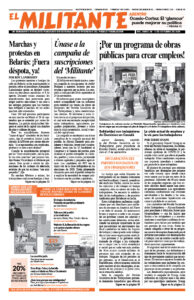One of Pathfinder’s Books of the Month for September is The Socialist Workers Party in World War II by James P. Cannon. Cannon was a founding leader of the American Communist Party in 1919 and served on the executive committee of the Communist International. He was expelled from the CP after it was taken over by Stalinist leadership. He went on to become national secretary of the Socialist Workers Party. He joined the international fight led by Leon Trotsky against the counterrevolution against Lenin’s course carried through by Joseph Stalin in the Soviet Union and the Communist International. The excerpt is from a 1943 article, “The End of the Comintern and the Prospects of Labor Internationalism.” Copyright © 1975 by Pathfinder Press. Reprinted by permission.
BY JAMES P. CANNON
So far nobody has discussed the question from the point of view which brought the Communist International into existence, that is, from the point of view of organizing and furthering the worldwide struggle of the proletariat for emancipation from capitalism. But it is this point of view that I want to bring to the discussion here this evening.
Of course, the announcement of the formal dissolution of the Comintern is simply the news account of a burial that is ten years overdue. …
This belated burial of the corpse of the Comintern is a climax, we might say, to a long sequence of events which has extended over two decades. These events, in their highlights, can be noted: the death of Lenin; the promulgation for the first time, in 1924, of the theory of socialism in one country; the bureaucratization of the Comintern and all of its parties; the expulsion of the Bolshevik-Leninist Opposition, first in the Russian party and then in the other parties of the Comintern; the capitulation of the Communist Party of Germany, with its 600,000 members and its six million voters, without a struggle and without a fight, to Hitler fascism in 1933; the organized, systematic betrayal of the proletariat of the world in the interest of the diplomatic policy of the Kremlin; the murder of the Old Bolsheviks; the assassination of Trotsky; the betrayal of the proletariat in the Second World War, first to Hitler and then to Roosevelt and Churchill.
Since the beginning of the war the Comintern, the unburied Comintern, was silent as the grave. Now it is formally buried, and that, at least, is a good thing. … By the formal burial of the Comintern, Stalin, for once on the international arena, has unconsciously performed a progressive act.
The bourgeois press and public generally, the political leaders and spokesmen, are very well pleased with the recent pronouncement, even if they understand that it is only a formality. They have good reason to be pleased. The dissolution of the Comintern, and the cynical repudiation of internationalism and the international proletarian organization, is an ideological victory of vast importance for capitalism and reactionary nationalism. …
They have good reason to applaud the action of Stalin, taken through his puppets in the so-called Executive Committee of the nonexistent Comintern, because the renunciation of internationalism is a renunciation of the basic premises of scientific socialism. It is a renunciation of the cardinal doctrine which has guided and inspired the struggle of the workers for generations, since Marx’s day. The modern movement of international socialism began with the Communist Manifesto in 1848, ninety-five years ago, with its battle cry: Workers of the World Unite! The Communist Manifesto proclaimed the doctrine that the emancipation of the workers could be achieved only by their common actions on an international scale. Against the cardinal principle and battle cry of Marx and Engels, and of all revolutionary socialists since that time — Workers of the World Unite! — Stalin has announced a motto of his own: Disband your international organization; give up all thought of international collaboration; support your own imperialists; and confine your activities to the national framework of the country in which you are enslaved.
Internationalism was not a dogma invented by Marx and Engels, but a recognition of the reality of the modern world. It proceeds from the fact that the economy of modern society is a world unit requiring international cooperation and division of labor for the further development of the productive forces. The class struggle arising from the class division between workers and exploiters within the countries requires class unity of the workers on an international scale. From the beginning, the program of scientific socialism has called for the international collaboration of the workers and oppressed peoples in the different countries, with all their different levels of development, in order that each might contribute their strength as well as their weakness to a united world program and world cooperative action. The Communist Manifesto called for common efforts of the workers in all countries for the common goal of workers’ emancipation.
After the downfall of feudalism, the national states played a progressive role as the arena for the development and expansion of the forces of production in the heyday of capitalism. But these very national states, whose sanctity is proclaimed by Stalin in 1943, became obsolete long ago. They have become barriers to the full operation of the productive forces and the source of inevitable wars. The whole pressure of historic necessity is for the breaking down of the artificial national barriers, not for their preservation.
Just as the petty states and principalities and arbitrarily divided sections of the old countries under feudalism had to give way to the consolidated, centralized national states in order to create a broader arena for the development of the productive forces, so, in the same way, the artificially divided national states have to give way to the federation of states. In the future course of development this must lead eventually to a world federation operating world economy as a whole without class and nationalistic divisions. From this it follows irrevocably that such an order can be created only by the international collaboration and the joint struggle of the workers in the various countries against their own bourgeoisie at home and against capitalism as a world system.


